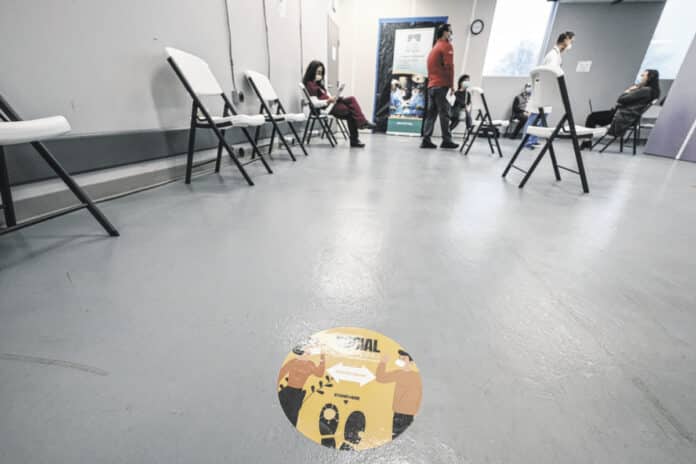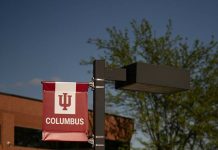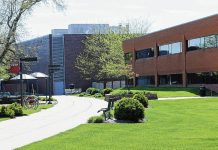COLUMBUS, Ind. — Local health officials are increasing outreach to the Black community to encourage them to get COVID-19 vaccines when their turn comes as data from some states — including Indiana — show they are not getting vaccinated in proportion to their share of the population.
The Bartholomew County-area NAACP is in the process of scheduling events aimed at providing educational materials to the local Black community on how to get COVID-19 vaccines and their safety, including panel discussion with medical professionals and people who have already received vaccinations.
On Jan. 18, the NAACP held a discussion via Zoom on COVID-19 and the Black community as part of an all-day commemoration of Martin Luther King Day co-sponsored by IUPUC.
Currently, Black residents make up 9.8% of Indiana’s population but only 3.9% of those who have gotten a COVID-19 vaccine, according to the Indiana State Department of Health. In contrast, white residents make up 85.1% of the state’s population but 85.2% of COVID-19 vaccinations. County-level vaccination data is not available by race and ethnicity in Indiana.
“I’m hoping that the numbers are low because we’re looking for the educational piece in it, we’re looking for the assurance that the vaccine is productive and working,” said Johnnie Edwards, president of the Bartholomew County-area branch of the NAACP.
Health experts across the country have said a history of systemic racism and inequity in access to health care and economic opportunity has made many Black people far more vulnerable to the virus, The Associated Press reported. They also say that historic failures in government responses to disasters and emergencies, medical abuse, neglect and exploitation have generated distrust of public institutions among Black Americans.
On Thursday, Democratic lawmakers urged federal health officials to address racial disparity in vaccine access nationwide, according to wire reports. As of Jan. 19, just 17 states were releasing public data on vaccine distribution by race and ethnicity, according to the Kaiser Family Foundation, a California-based non-profit.
Without that information, policymakers and health workers cannot efficiently identify vaccine disparities in the hardest-hit communities, said a letter signed by Rep. Ayanna Pressley and Sens. Elizabeth Warren and Edward Markey, all from Massachusetts.
A lack of transparency on who is receiving the vaccine will only create greater distrust of health officials, the lawmakers said in the letter.
Black adults suffer disproportionately from obesity, heart disease, diabetes and asthma — all of which are risk factors for severe illness from the virus that causes COVID-19 — and are less likely to have those conditions under control.
Additionally, Black people are more likely to be uninsured and often report that medical professionals take them less seriously when they seek treatment.
In the United States, Black people have died from COVID-19 at 1.5 times the rate as white people, according to the COVID-19 Tracking Project, which compiles COVID-19 statistics by race and ethnicity in all 50 states and the District of Columbia.
“There are diseases that are more prevalent in certain communities of color that are risk factors for COVID,” said Dr. Slade Crowder, CRH vice president of physician enterprise operations and associate chief medical officer. “A good example, diabetes, doesn’t hit all populations the same, and the reason that those communities have more diabetes is sort of complex. Some of it’s social, some of it’s economic. …And part of it is just there’s disparity in access to health care across races.”
According to the U.S. Department of Health and Human Services, Black adults are 60% more likely than non-Hispanic white adults to be diagnosed with diabetes and 40% more likely to have high blood pressure. Additionally, in 2015, black women were 20% more likely to have asthma than non-Hispanic whites.
In addition, surveys suggest that Black Americans are more likely than any other racial or ethnic group in the U.S. to say they would “definitely not get” a COVID-19 vaccine “even if it was free and determined safe by scientists,” according to a poll by the Kaiser Family Foundation.
Some call such skepticism the “Tuskegee effect” — distrust linked to the U.S. government’s once-secret study of black men in Alabama who were left untreated for syphilis, according to wire reports.
Launched in 1932 by the U.S. Public Health Service, the Tuskegee study involved roughly 600 poor black men in Alabama who weren’t treated for the sexually transmitted disease so researchers could track its progress. The program was exposed and ended in 1972, and then-President Bill Clinton formally apologized in 1997.
The Tuskegee legacy has helped pollute the black community’s relationship with American medical science, according to wire reports. A 2016 paper found the fallout included mistrust of medicine among black men, along with fewer interactions with doctors and higher mortality rates.
Crowder said doctors need to “go meet people where they are in their communities,” acknowledge the past and talk about what has changed in medicine to build back trust.
“(The lack of trust) is understandable,” Crowder said. “…I think that Tuskegee incident from years ago is not forgotten.”
Edwards said he believes the hesitancy among some in the Black community comes, in part, from media reports that include “statistics of African Americans dying (from COVID-19) at a higher rate” and the nation’s history with unethical practices in medical research on Black people.
“We want to be careful because there was a statement before that we’re just going to test all these vaccines on the minority community, Edwards said. “Well, that’s not a good statement when you’re looking at some of the past history with Tuskegee and other vaccinations given to the African American community and we started dying. No one wants history to repeat itself. So, therefore, that’s where the hesitation comes from.”
“We’re relying on our doctors and medical professional to help us understand the effects of the virus itself,” he added.
However, Edwards said he is optimistic that the rate of Black people in Indiana getting vaccinated against COVID-19 will increase as more people hear about positive experiences with the vaccine.
“I do know some African Americans in the community that have already taken the first shot, and we’re hearing good things from them as far as side effects and how they’re feeling and recovering very well. So when you start hearing that … that’s where we’ll see that number grow and the percentages change in the African-American community because we’re building trust. We’re becoming more educated and that’s key.”





